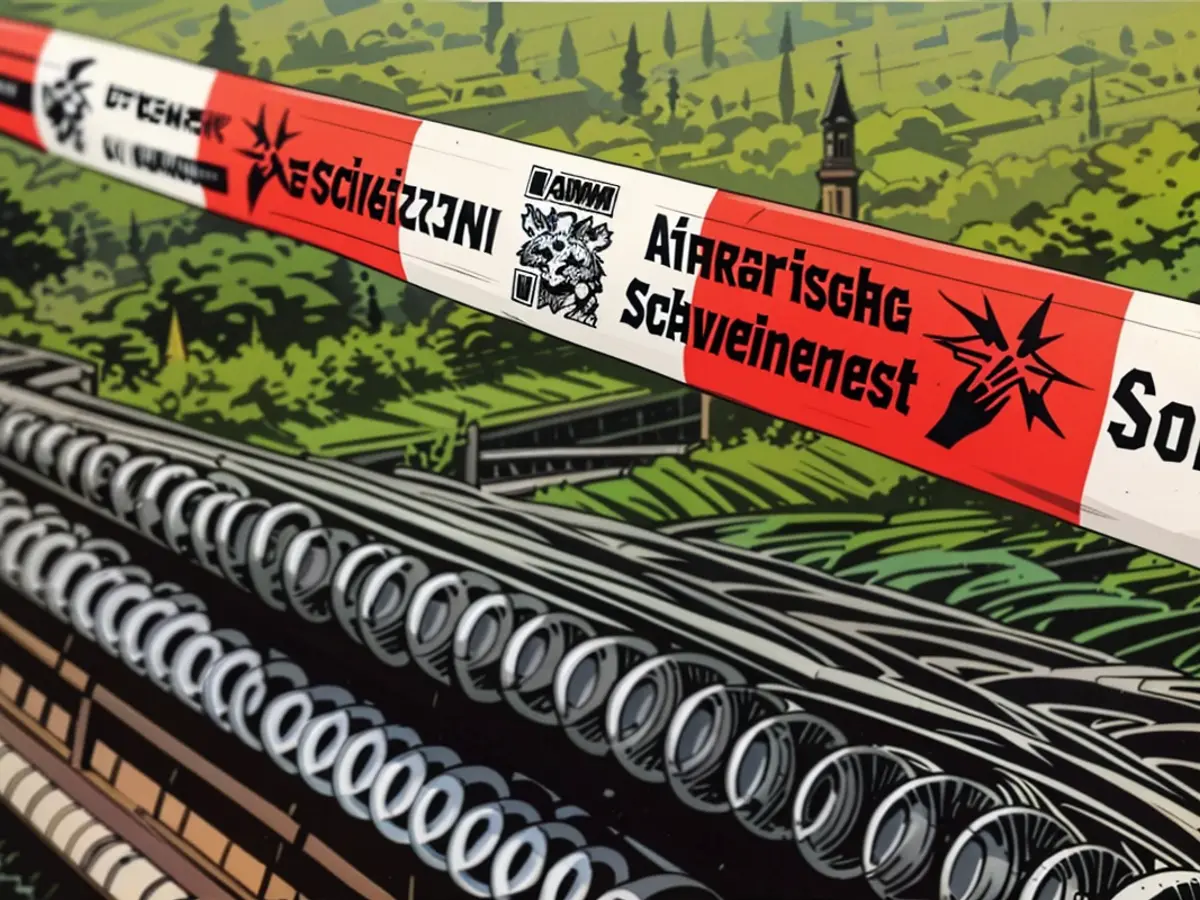- Swine fever in feral pigs detected in the south-west
African Swine Fever has reached Baden-Württemberg after outbreaks in neighboring states of Hesse and Rhineland-Palatinate. A laboratory has confirmed the presence of the virus in a wild boar killed in the Rhein-Neckar district, said Agriculture Minister Peter Hauk (CDU) in Stuttgart. The laboratory tests showed a high viral load. The official confirmation by the Friedrich-Loeffler-Institute is expected later today and is a formality.
The visibly sick animal was shot by a hunter near Hemsbach in the Rhein-Neckar district, Hauk said. The location is close to the state border with Hesse, where the animal disease has been spreading for several weeks.
Pigs in Baden-Württemberg have not yet been affected by the virus. "To keep it that way, biosecurity measures must be strictly adhered to," said Hauk. The main goal is to contain the spread of the disease. Due to the detection in the Rhein-Neckar district, the restricted zone will be expanded, Hauk said.
Protective zones around the discovery site
A 15-kilometer restricted zone II is being established around the discovery site, which extends to the city of Mannheim and parts of the Rhein-Neckar district, according to the ministry. Pigs may only be transported if they have been tested for the virus beforehand. Pig keepers must also comply with special safety and hygiene measures.
According to the ministry, 31 pig keepers are affected by the measures in restricted zone II. Hunting is strictly prohibited in this zone to prevent wild boars that may be carrying the virus from being disturbed.
A 10-kilometer buffer zone around restricted zone II is being established, which includes the Rhein-Neckar district and the city of Heidelberg. According to the ministry, 25 pig operations are affected here, which must take special measures. An extended buffer zone also includes the Neckar-Odenwald district, where intensified hunting will now take place to prevent further spread of the disease, and carcasses found or shot will be tested for the disease.
Hauk: "Combating the disease will not be a sprint, but rather a marathon"
Cadaver search dogs and drones are being used to find dead wild boars. Protective fences that have already been set up to prevent the further spread of infected animals will also be extended.
Agriculture Minister Hauk expects the disease to continue to occupy the southwest for some time. "Combating the disease is not a sprint, but rather a marathon," said the CDU politician. He assured consumers that the virus is harmless to humans and appealed to them to continue buying regional pork. "There is no reason not to do so."
Transmission from animal to animal or indirectly
There is no possibility of vaccinating pigs against the viral disease. It runs almost always fatally in both domestic and wild pigs and can be transmitted directly from animal to animal or indirectly via contaminated objects such as clothing and shoes, as well as feed. It is also possible that the disease is introduced through carelessly discarded food remains such as a salami sandwich or a hunter's sausage.
For pig-keeping operations, an outbreak of the disease is an existence-threatening risk. In addition to the culling of the animal population, there is also a risk of loss of genetics and a ban on the herd with resulting space and animal welfare problems.
The last case in Baden-Württemberg was in May 2022.
The first case in Germany was detected on September 10, 2020 in a wild boar in Brandenburg. The first and, until then, last outbreak of African Swine Fever in Baden-Württemberg occurred in a farm in Forchheim (district of Emmendingen) at the end of May 2022. According to the Ministry of Agriculture, pigs likely had access to improperly disposed, virus-containing food waste.
The following are the main subjects covered by the programme to combat African Swine Fever: protective zones, biosecurity measures, culling of animal population, special safety and hygiene measures, hunting restrictions, use of cadaver search dogs and drones, and extension of protective fences.
In this programme, three zones have been established: a 15-kilometer restricted zone II, a 10-kilometer buffer zone around it, and an extended buffer zone including the Neckar-Odenwald district, each with specific measures and restrictions for pig operations and hunters.






